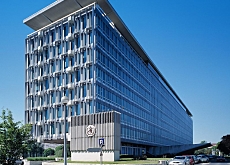
Swiss bureaucrats lured abroad

Switzerland is the host country for around 30 international and intergovernmental organisations but is itself underrepresented in almost every institution.
After several years trying to interest Swiss graduates in international posts, the foreign ministry is slowly starting to see the fruits of its labours.
There is currently an imbalance between the amount Switzerland pays to international organisations and the number of Swiss staff.
Some 750 Swiss nationals work for 120 international organisations worldwide – or 1.8 per cent of the total staff – but at the same time Switzerland is the 12th-biggest donor.
Young Swiss job hunters – especially those with skills in finance, technology, economics, environmental or cultural affairs – have a good chance of finding a job with international organisations such as the World Food Programme, the World Health Organization or the United Nations Children’s Fund.
Despite this, Switzerland remains heavily underrepresented in general.
Factors
“There are many different reasons for this,” said foreign ministry spokesman Johann Aeschlimann. “One is that potential candidates are often unwilling to accept posts that will take them away from home.”
More than half of the Swiss working in international organisations are based in Geneva, where salaries are comparable with those paid abroad. Attractive pay conditions overseas therefore do not have the same pull-factor for Swiss candidates as they do for those from developing countries.
The heavy application process also acts as a deterrent. Candidates sometimes have to wait for over a year to receive the results of their UN entry tests, known as the “National Competitive Recruitment Examinations”.
Those applying from countries with fewer opportunities generally show greater patience battling their way through the bureaucratic jungle in search of their dream job.
Although it is occasionally cited as a reason, Switzerland’s late admission to the UN in September 2002 has not been a factor behind the low numbers. For several years it has contributed financially to various UN funds, programmes and specialised agencies, and jobs in these institutions have remained open to the Swiss.
Rising
In an effort to buck the trend, the foreign ministry has been carrying out over recent years information campaigns to improve young graduates’ knowledge of international organisations and their career possibilities.
As a result, the number of Swiss nationals working in international posts has steadily risen, and those taking the UN entry exam doubled in 2006 compared with 2005.
The idea of working at the main UN secretariat has become so attractive that the Swiss quota will soon be used up and next year the “National Competitive Recruitment Examinations” will probably be the last where Switzerland is eligible.
Despite the success stories, the foreign ministry is not aiming to become an international job agency.
“If you don’t have your own people working [in these places], you don’t have any influence over the organisations or how the money is being spent,” said Aeschlimann, adding that without its own staff Switzerland has to rely on second-hand information.
Securing a top international post, where Switzerland is reasonably well represented, nonetheless remains a formidable challenge and country quotas rarely enter into the equation.
Decisions are taken based on political manoeuvring or behind-the-scenes agreements and without the blessing of their own diplomats even the most highly qualified candidates stand little chance.
swissinfo, based on article previously published by NZZ
Switzerland took up its seat as the 190th member of the UN on September 10, 2002. Meanwhile, Swiss voters have consistently rejected moves to bring Switzerland into the European Union.
In 1960, Switzerland was a founding member of the European Free Trade Association (Efta); in 1963 it joined the European Council and in 1975 the Organisation for Security and Cooperation in Europe (OSCE). It is also a member of the Organisation for Economic Cooperation and Development (OECD). Switzerland has been a member of the World Bank and the International Monetary Fund since 1992.
Geneva houses about 200 international organisations and diplomatic missions from about 170 countries. It is the European headquarters of the United Nations and headquarters of the International Committee of the Red Cross.
(2005 figures)
International organisations in Switzerland with headquarters agreements: 25 (22 in Geneva).
Annual total budget of international organisations in Geneva: SFr8 billion.
Switzerland’s contribution to international organisations based in Geneva: SFr237 million.
Switzerland’s contribution to the UN regular budget: SFr26.25 million.

In compliance with the JTI standards
More: SWI swissinfo.ch certified by the Journalism Trust Initiative




























You can find an overview of ongoing debates with our journalists here . Please join us!
If you want to start a conversation about a topic raised in this article or want to report factual errors, email us at english@swissinfo.ch.